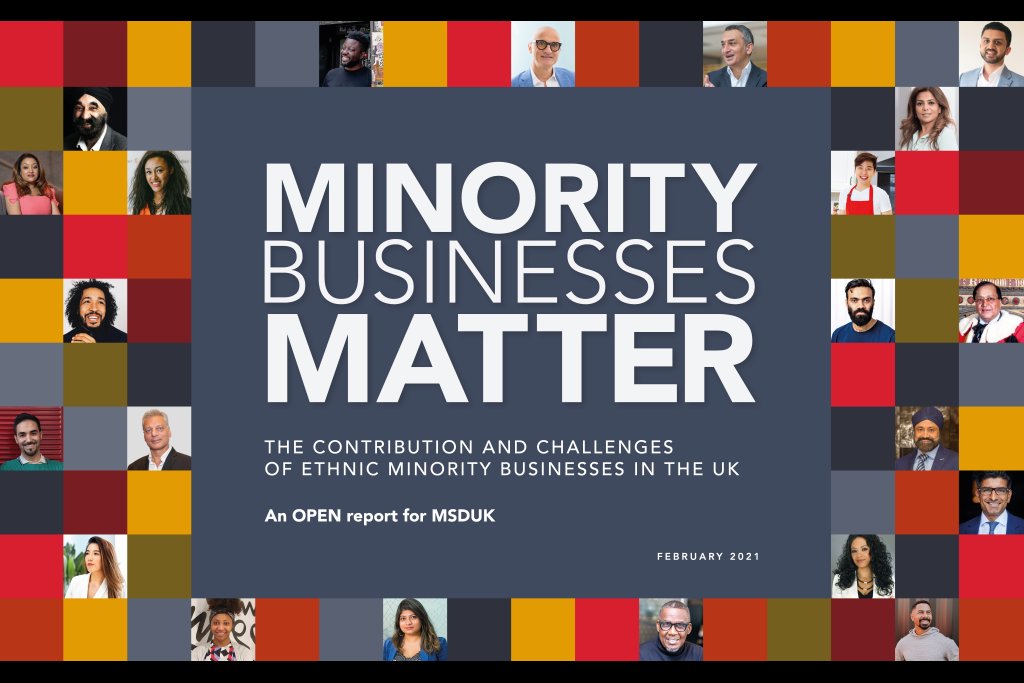New report shows EMBs contribute £74bn to UK economy

Businesses led by ethnic-minority entrepreneurs contribute at least £74 billion a year to the UK according to a new report published today. The report by OPEN, a London-based think-tank that focuses on migration and diversity issues, was commissioned by MSDUK, a Leicester-based membership organisation that champions diversity and inclusion in public and private-sector supply chains.
Minority businesses make up a sixth of the 6 million businesses registered in the UK and employed nearly 3 million people in 2019–20.
Since Companies House does not collect data on the ethnicity of corporate officers, the report’s estimates of minority businesses’ numbers, employees and gross value added are derived using artificial intelligence (AI) tools to predict owners’ ethnicity on the basis of their name – performed by Gyana, a minority data-science company – cross-checked and refined with human expertise at OPEN.
Minority Businesses Matter also provides a first-of-its-kind analysis of the economic contributions made by minority businesses: to combating the coronavirus crisis, to exports, innovation and the levelling up deprived areas, among other things, as well as to national wealth and local jobs.
The report, sponsored by EY, reveals that eight of the UK’s 23 tech unicorns – private start-ups valued at $1 billion (£740 million) or more – were co-founded by minority entrepreneurs.
In addition, 23 of the UK’s top 100 fastest-growing companies in 2019 were co-founded by minority entrepreneurs, including the No1, Bulb Energy.
Yet the contribution and unique challenges encountered by minority entrepreneurs are often overlooked by policymakers, the wider business community and the public.
The report finds that minority entrepreneurs succeed against the odds, identifying consistent challenges when establishing and scaling up their businesses. These include direct and indirect discrimination; disconnection from key financial, business and political networks; and disproportionate levels of doubt. While these challenges hold many minority businesses back, minority entrepreneurs also have particular strengths, notably their drive to succeed, determination to overcome challenges and diversity of skills, perspectives, experiences and contacts.
Minority Businesses Matter provides practical recommendations to help realise the untapped potential of the UK’s minority businesses.
These include:
- Diversifying big business – Large businesses should make public their annual spending on procurement from minority businesses and commit to establishing or enhancing their supplier-diversity programmes.
- Addressing racism systematically – In addition to providing anti-racism training to try to change perceptions of people from minorities, government, businesses and other organisations need to put in place rigorous processes to systematically address discrimination in their recruitment, promotion, procurement, investment and other business decisions.
- Reframing policy conversations – Government decision-makers at all levels need to take more account of the interests of minority businesses in framing policy, regulations, funding and support programmes.
- Boosting self-confidence from the ground up – Schools, universities and other education and training providers need to do more to equip young people from minorities with the self-confidence and skills to succeed.
The report’s findings and recommendations spotlight the disproportionate challenges the UK’s minority entrepreneurs face. Its publication comes at a time of growing global support for the Black Lives Matter movement and its efforts to highlight structural racism and the unique challenges minority communities have faced throughout the Covid pandemic. At the same time, the report stressed that stronger support for minority entrepreneurs would provide a significant boost to the UK’s economic output.
SPECIFIC CONTRIBUTIONS:
Minority Businesses Matter identifies six specific contributions made by minority businesses. These include:
- Combating the coronavirus crisis: Minority businesses have developed rapid, accurate, low-cost Covid tests, sourced life-saving personal protective equipment, kept elderly people safe in care homes, enabled the NHS to provide online GP consultations, delivered meals to families during lockdown and developed a virtual events platform.
- Tech progress: Minority-founded businesses in tech include DeepMind, the world’s leading AI company now owned by Alphabet, and other unicorns that are leaders in video games technology, small-business finance, data-privacy compliance and cybersecurity.
- Innovation: Overall, 20.8% of minority-led SMEs – and 24.3% of black-led ones – engaged in process innovation in 2018, compared with 14.8% of white-led ones. Minority SMEs are also much more likely to engage in product or service innovation (30.3%) than others (18.5%).
- Exports: Minority businesses can play a crucial role in boosting exports in a post-Brexit environment. The Top 100 had £18.5 billion in foreign sales in 2019–20, more than UK exports to Japan (£14.7 billion) in 2019 – and much more than exports to Australia (£12 billion) or Canada (£11.5 billion). Minority SMEs in every UK region are more likely to export than others. In 2018, 15% of minority SMEs exported, compared with 13.9% of other SMEs.
- Levelling up: Minority businesses can help the government achieve its top post-Covid priority of “levelling up” deprived areas outside London, notably because 21 of the 39 Top 100 businesses in England located outside London are based in deprived areas, as are four of the five Scottish businesses in the Top 100 and one of the two Welsh ones.
- Environmental sustainability: Britain’s leading retail energy supplier that relies exclusively on renewable energy, Bulb Energy, was co-founded by a minority entrepreneur. Minority start-ups are also helping to provide eco-friendly solutions to issues such as biodegradable wet wipes and waste-water treatment.
Key Recommendations
While minority businesses would benefit from a range of measures to help businesses in general, such as more generous coronavirus-crisis support measures, the report focuses on laying out recommendations to tackle the three main challenges of discrimination, disconnection and doubt.
Tackling discrimination
- Large businesses – starting with FTSE 100 leading companies and multinationals with UK operations – should make public their annual spending on procurement from minority businesses and commit to establishing or enhancing their supplier-diversity programmes.
The case for enhanced supplier diversity is compelling. Just as recruiters often limit their horizons to hiring people from similar social backgrounds who look like them, purchasing managers at big companies often restrict their procurement options to a small number of established larger suppliers with whom they have longstanding relationships. This does not just deny opportunities to promising smaller minority businesses. It also deprives larger mainstream businesses of the benefits of a more diverse, resilient, innovative and cost-competitive supply chain. A study by the Hackett Group, a leading US enterprise benchmarking firm, found that “on average, supplier diversity programmes add $3.6 million to the bottom line for every $1 million in procurement operation costs.”
- Government and public-sector bodies should take the lead in integrating supplier diversity into their procurement strategies, including the tender and contracting processes.
More broadly, tackling discrimination in business life requires changes in people’s mindsets, corporate processes and power structures.
- In addition to providing anti-racism training to try to change perceptions of people from minorities, government, businesses and other organisations need to put in place rigorous processes to systematically address discrimination in their recruitment, promotion, procurement, investment and other business decisions.
Creating connections
- While many have made big improvements, mainstream business organisations – such as the CBI, the Institute of Directors (IoD) and the Federation of Small Businesses (FSB) – need to make a bigger effort to attract minority businesses, cater to their specific needs and represent their interests more effectively.
- Organisations such as MDSUK that connect minority businesses with large corporates need to do more to provide specific information and advice to minority entrepreneurs, connect them to potential clients, partners, investors, mentors and other useful contacts and highlight their contribution and challenges to a wider audience, including policymakers.
- Government decision-makers at all levels need to take more account of the interests of minority businesses in framing policy, regulations, funding and support programmes. Policymakers should consult more regularly with minority businesses and minority-business organisations such as MSDUK. The British Business Bank, the UK’s public investment bank, should create a fund to invest in promising minority businesses, along the lines of the former Aspire Fund for female-led businesses. The government should devise a prestigious awards programme to promote innovative minority businesses, and black-led ones in particular, potentially modelled on the Women in Innovation Awards. Minority entrepreneurs also ought to feature more prominently in government export campaigns.
From doubt to self-confidence
- Schools, universities and other education and training providers need to do more to equip young people from minorities with the self-confidence and skills to succeed. Many of the UK-raised entrepreneurs we interviewed noted the low expectations that education providers and careers advisers had of them, a bias that many people from minorities may internalise. That needs to change, including through better training for education staff and better procedures – such as online aptitude tests – to assess young people’s potential, including as entrepreneurs.
- In addition to acting as role models, successful entrepreneurs – especially minority ones – ought to play a bigger role in mentoring the next generation of minority business founders.
- Greater community support is needed for minority entrepreneurs, notably black ones. While Asian entrepreneurs often benefit from strong family and community support, many of the black entrepreneurs we interviewed said they obtained less support. Black community organisations have a crucial role to play. Minority business networks such as MSDUK can also help provide this community support, either directly or by creating connections between people.
Better data
- To better gauge the performance, problems and policy needs of minority entrepreneurs, corporate officers should be required to provide their ethnicity and country of birth in Companies House filings. That information would provide the basis for much-needed additional research on the characteristics, contribution, challenges, interests and needs of minority businesses.
Philippe Legrain, Founder and Director of OPEN, said: “Against the odds, minority businesses make a huge contribution to the UK, providing valuable products and services, creating good jobs and boosting national wealth. They are helping to tackle the coronavirus crisis and can help build a fairer, more innovative and more environmentally sustainable Britain in its aftermath. So addressing the challenges that still hold minority businesses back is both an economic and an ethical priority.”
Mayank Shah, Founder and CEO of MSDUK, said: Immigrants move to the UK in search of a better future for themselves and their families, which makes them work harder and seize every opportunity to succeed. This report shows that the UK economy is much better off thanks to the contribution that ethnic minorities make at a local, regional and national level, a fact obscured until now by the lack of data on the ethnicity of business owners in the UK."
This report by OPEN for MSDUK highlights, for the first time, ground-breaking data on the economic contribution of ethnic minority businesses and backs it up with personal stories of many inspirational entrepreneurs. It offers reasons to celebrate the successes of many ethnic minority businesses, while also challenging all of us to address the barriers they face and the disparities that exist between different communities.”
Click here to download a copy of the MSDUK 'Minority Businesses Matter' report.




